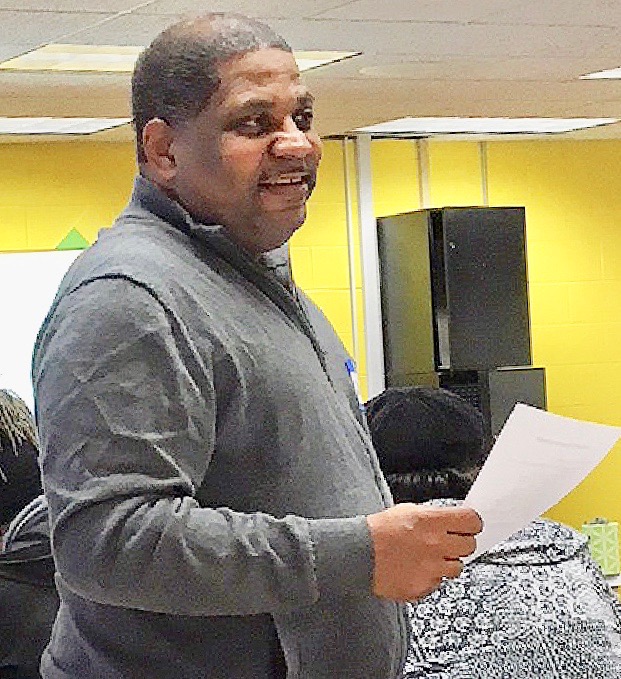By Patsy Isenberg
The complicated task of seeking out sources for grants to accomplish a goal and then applying for them was the theme of the fourth workshop of the “Neighbors Changing Flint” series Wednesday evening at the Sylvester Broome Empowerment Village.
There’s a lot to it, but the presenters at this workshop know how to do it and did their best to communicate it to about 50 people in the audience–many of whom already had some background themselves in applying for grants.
Most of the presenters work for agencies that do grant funding. They asserted even knowing what questions to ask at the outset can be difficult. They offered to take calls or meet with the residents once they were ready to ask the difficult questions, not surprising since the aim of the series is to help residents make changes in their neighborhoods after the workshops are over and as a result, improve the City of Flint.
Ashley Everhart, director of Neighborhood Engagement Hub, the host of the workshop series, kicked off the session by saying “Fundraising isn’t just going out and getting a grant application from The Ruth Mott Foundation. Fundraising is a process of going out and gathering voluntary contributions from any sort of source. It could be from individuals, it could be from businesses, it could be from a foundation, or a government agency.”
Everhart asked the attendees which sources they’ve used. Responses included Habitat for Humanity, the Community Foundation of Greater Flint, 50/50 drawings, the Ruth Mott Foundation and even association or club dues. Everhart said small businesses sometimes donate items for good causes and that Walmart or Gordon’s Food Service are known to donate funds or goods. In addition Everhart suggested individual contributions at an event or crowdfunding like gofundme.com.
Two 45-minute breakout sessions offered a choice of two topics in each session.
Breakout session #1 offered Topic #1: “Local Grant Resources” presented by Tryphena Clarke from the Ruth Mott Foundation; Lynn Williams from the Community Foundation of Greater Flint; and Mallory Stock from Genesee County Habitat for Humanity. Topic #2 was “Building Partnership through Sponsor and In-Kind Supporters” presented by Sandra Johnson from Hamilton Community Health.
Williams suggested a strategy of making initial contact to the foundations or potential backers, trying to establish a relationship with officers or relevant staff to communicate what the funds would be for, and determining if the particular agency was a good match. She also stressed the importance of reading the instructions for submitting an application carefully, and then reading it again to make sure you understand what is required.
Williams then called on Willie Smith, one of the attendees, from the West Pulaski Street Block Club, for his input. He offered suggestions from his own experience from fundraising.

Willie Smith offering suggestions for fundraising (Photo by Patsy Isenberg)
“Have a mission statement,” Smith said. “Don’t sell yourself short, include anything that’s provided by you, such as people to do the job, the space to do the job, that has value. If you are unsure of anything ask the grantor for help for clarification.” He said it made sense to go to somebody else who’s written grants before for advice.
For small grants in particular, he advised, a bank account in a block club’s name might be required. Further, he said, make sure not to turn an application in late.
Even after the grant is given and the money has arrived, Smith said, to appreciative laughter, “It’s not over yet.” Take pictures, which can say a lot about your project. Keep receipts because the funder will want that on the final report. And turn in your final report on time, he said.
The three presenters detailed their specific agency’s preferences and how best to meet their requirements. which vary from agency to agency.
Topic # 2, “Building Partnership through Sponsor and In-Kind Supporters,” addressed a different type of help. In the handout for this topic “sponsorship” is defined as “fee exchange for benefits (cash or in-kind) not tax deductible.” “In-Kind” is defined as “covering the cost of service instead of exchange of cash.”
This type of “funding” can be less about money and more about giving of time and collaboration with the result being a mutual benefit, the presenters explained. This help is often given because of a relationship between the two parties, attractive marketing benefits, brand alignment, social benefits, or special treatment benefits.
Breakout Session #2 covered “Fundraising Events, Sponsorships, and Crowdfunding,” presented by Kenyetta Dotson from WOW Outreach. Everhart covered “Working with a Fiduciary.”
Topic #1, “Fundraising Events, Sponsorships, Crowdfunding” described less formal fundraising opportunities, often extended to those the person seeking funds already knows. Dotson offered tips on how to organize this type of fundraising. There are right and wrong ways to do this and experience informed ways that prove to be the most successful.
Topic #2, “Working with a Fiduciary,” covered the use of a second agency (fiduciary) or intermediary and why it might be necessary. A fiduciary or fiscal agent is described in the handout given as “… a nonprofit organization that provides fiduciary oversight, financial management and other administrative services to help build the capacity of charitable projects.”
Everhart works for one of these, the Neighborhood Engagement Hub. The NEH works with those receiving funds from foundations or other formal agencies and handles most of the administrative tasks that arise between the funder and the recipient.
Everhart gave many examples of situations that run more smoothly if there is a go-between or fiduciary that understands, for instance, what reports need to be filed and what communications between the two parties need to take place.
Having a fiduciary also “lends credibility to funder as recognized 501(c)3” and “allows funder or donor tax exemption and contribution acknowledgement” as well as retaining “control and discretion over funds,” Everhart said. A fiduciary charges a fee, usually a percentage of the grant amount, for this service.
The presenters offered to meet with anyone who had further questions or who is ready to apply and write proposals. The packet given to the attendees at the workshop was full of handouts and contact information to get things started.
The next workshop, #5, will be 5 to 8 p.m. Wednesday, March 20, again at the Sylvester Broome location. The theme will be “Promoting Health and Active Living through Neighborhood Design.” The final workshop will be 5 to 8 p.m. March 27: “Planning for Long Term Change.” To attend either of the last two sessions, RSVP at tinyurl.com/neighborschangingflint, email director@neighborhoodengagementhub.org or call 810-620-1299, ext 2.
Banner photo of “Neighbors Changing Flint” workshop participants by Patsy Isenberg.
EVM staff writer Patsy Isenberg can be reached at pisenber@gmail.com.


You must be logged in to post a comment.